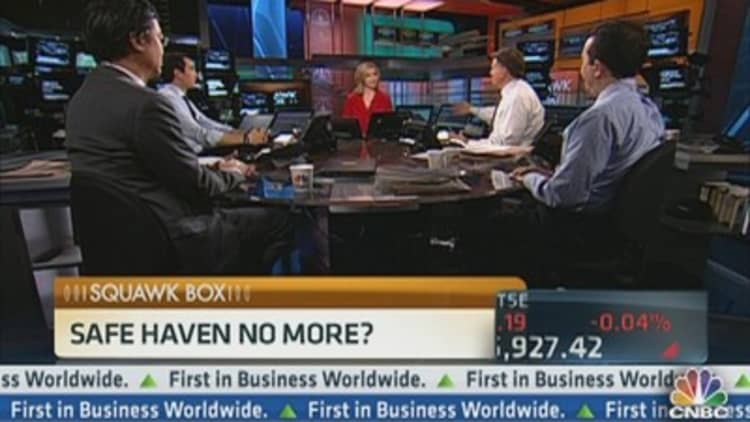
The dollar fell from a near nine-month high against the yen while the euro surged to its highest against the greenback since early May on Friday as U.S. inflation data affirmed the Federal Reserve's ultra-easy monetary policy.
The dollar dropped for a fifth straight day against the euro after a U.S. report showed prices fell in November for the first time in six months. The Fed, for the first time in its history, on Wednesday announced it would link its policy to the level of joblessness and inflation.
The U.S. central bank said it expected to hold interest rates near zero until the unemployment rate falls to at least 6.5 percent, as long as inflation does not threaten to break above 2.5 percent.
"The inflation data continues to be benign and there is very little in the way of price pressures in the economy," said Omer Esiner, chief market analyst at Commonwealth Foreign Exchange in Washington. "That therefore justifies the Federal Reserve's action to keep a very accommodative monetary policy."
The euro was on track for its biggest weekly gain against the dollar since the week Sept. 16 after reaching a high of $1.3173, its highest since early May. It was last at $1.316, up 0.6 percent on the day.
The euro climbed to an eight-month high of 109.98 yen and last traded at 109.84 yen, up 0.4 percent on the day. Option barriers were reported at 110 yen.
"There's a race to cheapen currencies, and I don't think the U.S. is going to win," said Rick Rieder, chief investment officer, BlackRock Fundamental Fixed Income, speaking at a media briefing Wednesday. BlackRock has $3.6 trillion in assets under management. "Places like Europe and Japan will win the race to cheapen their currencies."
Euro gains, however, could be limited in the coming weeks as investors fret about the "fiscal cliff".
If Congress fails to reach a deficit-reduction deal by the end of the year it would automatically trigger massive spending cuts and tax increases in 2013, which could push the nation into another recession.
The fiscal cliff, however, should buoy the dollar due to its status as a safe-haven and hurt currencies perceived as riskier.
With talks between President Barack Obama and House of Representatives Speaker John Boehner at an apparent standstill, analysts said Friday it was increasingly likely Washington won't be able to reach a deal before Jan. 1.
Currencies
Little progress was expected on Friday, with Boehner set to return to his congressional district in Ohio for the weekend.
The dollar fell 0.2 percent to 83.47 yen, having risen as high as 83.96, its highest since March 21, according to Reuters data. Still, it was not far from its March 2012 peak of 84.17, which is seen as a major resistance level.
Traders cited an options barrier at 84 yen as the options market still shows increasing bias for yen weakness with investors buying yen puts.
Bets that the yen will weaken had risen significantly as Japan looked set to get a prime minister keen to push for the central bank to print more money to stimulate the moribund economy.
Japanese media reported the conservative Liberal Democratic Party is set for a resounding victory in elections on Sunday, cementing speculation that LDP leader Shinzo Abe will be in a strong position to push for bold monetary easing.
Against the yen, the dollar has risen around 4 percent in the last four weeks, and there are technical signs the pair has risen too far too fast, with 14-day relative strength index standing well above the "overbought" mark of 70.
Some said the yen may rally further next week if the Bank of Japan underwhelms investors at its next meeting. The BoJ is widely expected to loosen monetary policy, although there is scope for market players to be disappointed by the amount of assets it decides to purchase.

